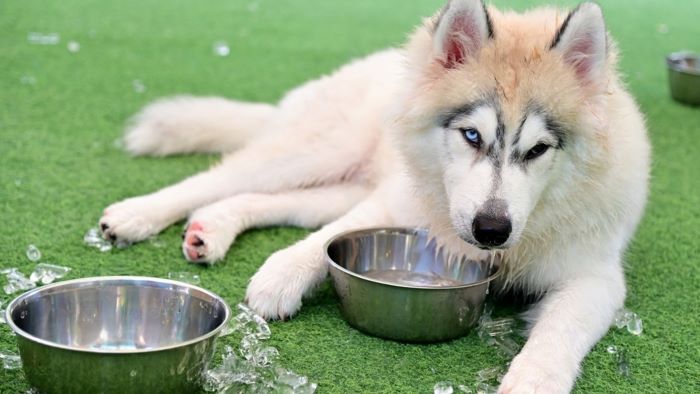During the hot weather, when the bright sun is upon us, we think about ways to keep ourselves cool. For us, there’s nothing like a glass of ice water to help cool you down on a hot day. It refreshes us immediately. But, what about our furry friends who seem to struggle with keeping themselves cool in this hot weather? You might wonder, to share your ice cubes with your dog to keep itself cool, but does ice have the same effect on dogs?
In this article, we will discuss- Can dogs eat ice cubes? by thoroughly discussing their merits and demerits for our dogs. Continue reading to find out.
Can Dogs Eat Ice Cubes?

It may be surprising for many dog lovers, and a few pet owners may already know, dogs don’t sweat! Their only way of cooling down is by panting or through their paw pads. Thus, it becomes increasingly important for them to find external ways to cool down, often. Eating ice or drinking ice water helps bring their body temperature down quickly.
So, can dogs eat ice cubes? The answer is very simple, absolutely yes! Eating or licking ice can help your dog to quickly cool down. Ice cubes are water in a frozen form, that can cause no harm to your dog. Water is essential for your pet to stay hydrated, and it doesn’t matter if the water comes in liquid or frozen form, i.e. Ice cubes.
Can Ice Cubes Help Prevent Dogs from a Heatstroke?
If your dog is at risk of heatstroke, ice cubes alone probably won’t be enough to cool him down. Have him lay on a cold surface and offer small sips of water. You might also place a cold compress on your dog or mist him with cool water to help him return to his regular core temperature. Ice cubes most likely won’t be sufficient to keep your dog cool if he is in danger of suffering from heatstroke.
Provide him little sips of water while having him lie down on a cold surface. To help your dog get back to his normal core temperature, you might also apply a cold compress to him. Heatstroke is a serious condition that could be life-threatening for your dog. If you think your dog is exhibiting the symptoms of a heatstroke, you should visit your vet immediately.
When Are Ice Cubes Dangerous for Dogs?
While ice cubes can be a fun and refreshing treat for dogs, there are certain situations in which they can be dangerous. Here are some of the instances when ice cubes may be hazardous to your dog:
Choking:
If a dog bites off a piece of an ice cube that is too large, it can become lodged in its throat and cause choking. To prevent this, always supervise your dog when they are eating ice cubes and break them into smaller pieces if necessary.
Dental issues:
Dogs with dental issues such as loose teeth or gum disease may find it difficult to chew on ice cubes. Chewing on ice cubes can be too hard for their teeth and cause pain or further damage.
Bloating:
Bloat occurs for various reasons, including ingestion of large volumes of food, water, or air. For example, if eating ice causes your dog to gulp or drink water excessively, it could put them at higher risk for developing bloat.
If your dog appears extra thirsty, ice cubes may not be the best choice for quenching his thirst. Excessive thirst can signify many diseases, so check with your veterinarian if you feel your dog is drinking more than normal.
There are also some homemade treats you can make easily at home to help cool your dog. But remember, not all human foods are safe for dogs. For example, many dog owners ask, can dogs eat nuts?
Alternatives to Ice-cube

If you think ice-cubes are not the best way to cool down your dog, then you can use the following alternatives:
Frozen dog treats:
There are many frozen dog treats available on the market, such as frozen doggy yoghurt, ice cream, or frozen fruit pops.
Cold, damp towels:
Another way to help your dog cool down is to use cold, damp towels. Simply wet a towel with cool water and place it in the fridge or freezer for a few minutes to chill. Then, place the towel over your dog’s back or stomach to help lower its body temperature.
Shaded areas and water:
One of the best ways to prevent your dog from overheating is to provide them with access to shaded areas. Also try and limit the time your dog spends outdoors during hot and sunny days.
Other healthy treats like mackerel are also good options. Mackerel is rich in omega-3 fatty acids, which have many health benefits for dogs. But can dogs eat mackerel safely?
FAQs
Can eating ice cause my dog’s teeth to break?
If your dog has a habit of chewing ice cubes, your dog could be at risk of breaking one of his teeth. A broken tooth can be extremely painful and may even require a root canal or oral surgery to repair it fully. To reduce the risk of damage you can make ice cubes and frozen treats slightly softer by taking them out of the freezer 2-5 minutes before hand.
Can eating ice cause bloat?
When a dog’s stomach fills with gas and twists, cutting off the blood flow to the intestines, bloat can occur, posing a serious risk to life. Although the exact cause of bloat is unknown, eating frozen treats or ice cubes is not known to increase the likelihood that a dog would get bloat.
Can eating ice cubes cause choking in dogs?
Large bits of ice that may stuck in a dog’s trachea before melting should always be handled with caution because dogs can choke on them. However, feeding smaller ice or shave bits can also get over this problem.
How do I know if my dog is having a heat stroke?
You may notice that your dog is experiencing elevated breathing rates, excessive panting, vomiting, dry or sticky gums, abnormal gum color, bruising in the gums, may appear lethargic or disoriented, and can have seizures.
What causes heat stroke in dogs?
The most common reasons why dogs experience heat stroke include excessive activities outdoors, lack of ventilation, or being exposed to a hair dryer for an extended period of time.
Conclusion
So, can dogs eat ice cubes? Yes, dogs can eat ice cubes, and there are several potential benefits to doing so. From providing hydration to serving as a fun and healthy treat. However, it’s important to be mindful of the potential risks associated with ice cubes, including the risk of choking and detail damage.
As a dog owner, you should supervise your pup when you offer him ice cubes to be on a safer side. This way, you can step in if you feel your dog is at risk of choking or harming it’s teeth.
You may wonder “is mussels good for dogs?” when looking for healthy dog treats. As with any new food, check with your vet before feeding mussels.
References:
- Blue Cross. (n.d.). Ice cubes for dogs. Retrieved February 17, 2024, from https://www.bluecross.org.uk/advice/dog/ice-cubes-for-dogs
- Risks from a fractured tooth. (2022, July 28). Cornell University College of Veterinary Medicine. Retrieved February 17, 2024, from https://www.vet.cornell.edu/departments-centers-and-institutes/riney-canine-health-center/health-info/risks-fractured-tooth
- R. (2022, July 15). How To Keep Your Pets Cool During The Heatwave. IAPWA. Retrieved February 17, 2024, from https://iapwa.org/how-to-keep-your-pets-cool/
- Shannon, A. (2022, December 27). Make Summer Treats for Your Dog | AKC Reunite. Retrieved February 17, 2024, from https://www.akcreunite.org/pup-friendly-treats/



